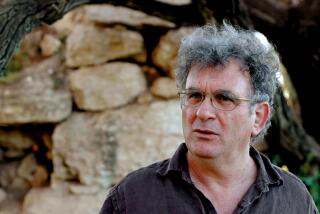BOOK REVIEW / NONFICTION : Israeli Diplomat’s Autobiography Offers Few Surprises : BATTLING FOR PEACE: A Memoir by Shimon Peres; Random House $25, 384 pages
When a career politician and diplomat--and especially one whose turf is the treacherous and tumultuous Middle East--sits down to write his memoirs, we should not expect much in the way of revelation.
And, in fact, we don’t get many state secrets of Israel or intimate details about Shimon Peres in “Battling for Peace,” an autobiography of the Israeli diplomat who shared the Nobel Peace Prize in 1994. Peres, for example, mentions his children only once, and only in a footnote on page 127.
Although he gives us a brief, bittersweet look at his childhood in a shtetl in White Russia and his adolescence in Palestine, he is mostly concerned with the political and diplomatic milestones of his career, which has included lofty positions in the Labor Party and the government of Israel for nearly a half-century.
Peres flashes back and forth through the recent history of the Middle East, ranging from the various wars between Arabs and Israelis to the historic peace-making efforts with Egypt, Jordan and the Palestine Liberation Organization. Still, some of the key concerns in Peres’ book may be a bit baffling to American readers who are not intimately familiar with Byzantine factional politics of Israel.
For instance, much of the narrative is shadowed by the so-called Lavon Affair, a failed intelligence operation that shook Israeli politics (and haunted Peres’ career) for several decades. But he touches only briefly and obliquely on the botched operation itself, and expends much more effort in explaining away the political taint that attached itself to him.
Even when he recalls some of the more stirring moments in the history of Israel, Peres focuses on what happened in the back rooms rather than the front lines. A whole chapter is devoted to the rescue of the hostages at Uganda’s Entebbe Airport, for example, but Peres is mostly determined to show how he stood up to a timid Yitzhak Rabin in demanding forceful action against the Arab and German terrorists who had hijacked a French airliner.
Peres freely offers his own assessment of the great men and women with whom he has worked over a long career, in Israel and around the world. David Ben-Gurion is described by Peres as “fearless, consistent and totally determined--he towered above the rest.” Golda Meir, by contrast, is depicted as vain, suspicious and contentious: “She could not tolerate anything less than adulation,” Peres insists.
Only rarely, however, does Peres give us a truly surprising moment, and only when his eye falls on some of the more colorful figures in Israeli politics. The dashing Moshe Dayan, says Peres, was irritated at the criticism of his romantic exploits: “Have I ever drowned a girl in a river?” he protested. And we encounter Dayan firing a shotgun from a balcony of the General Staff building; at first, it appeared that the famous general had gone mad, but it turned out that he was only preparing to celebrate his birthday.
“The main course will be roast pigeon,” explained Dayan, “and now I’m bagging the pigeons.”
At its best, “Battling for Peace” offers an important insight into the heroic struggle to create and sustain Israel as a Jewish homeland and the more recent efforts to make peace with the Arab world.
As a teen-ager growing up in the Jewish community in Palestine in the 1930s, Peres recalls, every aspect of daily life was charged with the urgent mission of inventing a Jewish state--even basketball games in the high school gym.
“We were gravely aware that sports were an element of the national struggle to revolutionize Jewish society and eventually attain Jewish independence,” Peres writes. “It was important, therefore, not to lose--whatever sport one was playing, and whomever one was playing against.”
Peres writes at length about his mentor, Ben-Gurion, and we come to understand how Peres turned out to be the first Israeli to reach an accommodation with the PLO: “Jewish statehood now, rather than holding out for Greater Israel” is a phrase that Peres uses to describe Ben-Gurion’s stance in the ‘40s, when Ben-Gurion favored partition of Palestine between Arabs and Jews, but the phrase also applies to the role played by Peres himself in the 1980s and ‘90s, when he met secretly with Jordan’s King Hussein in an early effort to make peace in the West Bank.
Peres is perfectly willing to claim credit for his role in history, and even more willing to explain away his own foibles and failings, but he is always decorous and deferential in comparing himself with the near-legendary figures who loom so large in “Battling for Peace.”
“I lived and worked in the shadow of these few,” Peres concludes, “and I was swept along with them to soaring heights.”
More to Read
Sign up for our Book Club newsletter
Get the latest news, events and more from the Los Angeles Times Book Club, and help us get L.A. reading and talking.
You may occasionally receive promotional content from the Los Angeles Times.






